Sudan
Protesters took to the streets Wednesday (May 17) in Port Sudan. Some gathered in front of the hotel hosting Volker Perthes, the UN' representative in the country, asking him to leave.
Deadly fighting between the Sudanese army and the paramilitary group RSF has killed around 1,000 people since April 15th. Some protestors blame the power struggle on the UN envoy.
"We have demanded that Volker, the UN envoy to Sudan, be removed from his position," Syed Ali Abu Amneh, the political secretary of Council of Beja Optics said.
"This man is the main one responsible for the war in Sudan. Because of what he has done and his contribution to the division and separation between the peoples of this same country. "
Demonstrators chanted slogans such as "one army one nation" or Volker out."
After the leader of the army and the head of paramilitary teamed up to derail a democratic transition
In October 2021 the leader of the army and the head of paramilitary teamed up to derail a democratic transition, some Sudanese groups condemned the UN's efforts to mediate between the military junta and civilian leaders.
Sudan's ongoing conflict halted the establishment of a transitional government led by civilians
Multiple fires burning
"Today, 25 million people -- more than half the population of Sudan -- needs humanitarian aid and protection," Ramesh Rajasingham, head of the UN humanitarian agency's Geneva bureau, told reporters on Wednesday (May 17).
With bullets flying, Rajasingham said millions remained confined to their homes, unable to access basic services and health care.
More than one million others have been uprooted by the battles between army chief Abdel Fattah al-Burhan and his former deputy Mohamed Hamdan Daglo, who leads the paramilitary Rapid Support Forces (RSF).
Analysts say neither side has been able to seize an advantage on the battlefield, which played out in one part of Khartoum on Tuesday (May 16).
Across the Nile river, aerial footage showed a hellish scene in the Omdurman Market area, a heavily built-up district where multiple fires burned and people ran on rubble strewn streets. Some appeared to be lugging white bags as heavy black smoke choked the air.
In Africa's third-largest country, many areas remain untouched by the fighting but still suffer its effects, with soaring prices and shortages of fuel.
"Petrol is not available now and the price has increased on the black market. People can't transport their vegetables," said Abu Bakr Abdullah, 27, a farmer in River Nile state.
Another farmer, Qamar al-Bashir, 52, complained that four years have passed since longtime autocrat Omar al-Bashir was toppled but "they have not been able to form a government".
A coup in 2021 by Burhan and Daglo derailed a fragile transition to civilian rule.
"Enough!" said Bashir, the farmer. "You can't move the country forward, do you move it backwards? And at the end you take us to war for your own personal interests."
However, reports of attacks continued.
Looting and destruction
Hundreds of civilians have been killed in militia attacks on residential areas and street battles between "community-aligned forces". There has also been looting and destruction at markets, camps for displaced people, and other locations, Toby Harward, of the UN refugee agency (UNHCR), wrote Tuesday (May 16) on Twitter.
Doctors Without Borders (MSF) on Wednesday (May. 17) called "unacceptable" the looting of aid organisations after armed men raided its Khartoum warehouse the day before.
In Khartoum North, a factory that produced food to treat malnourished children burned down earlier, according to the UN children's fund.
Still, the World Food Programme is distributing food in some Darfur states as well as other parts of the country in a "rapidly scaling up" of emergency operations, the agency said.
Rajasingham highlighted an uptick in aid deliveries and voiced hope the Jeddah agreement was having some effect. He said fighters had pulled back from some of the health facilities previously occupied.
But aid agencies need an increasing amount of money.
The UN said $2.56 billion is now expected to be required to provide assistance for 18 million people inside Sudan, plus an additional $470.4 million to help those fleeing the country.
More than 840,000 are already displaced inside Sudan and at least 220,000 have crossed borders out of the country, it said.
"The crisis in Sudan is rapidly evolving into a regional crisis," Rajasingham said.
Sudan's war is expected to be a major agenda item during the Arab League summit on Friday in Saudi Arabia, where an envoy of Burhan will represent the country.
Heavyweights in the pan-Arab bloc are divided on Sudan, with Egypt supporting Burhan and the United Arab Emirates, according to experts, seen to be backing the RSF.
On Wednesday, Kenyan President William Ruto urged the warring generals to "stop the nonsense" and called for a rethink of the African Union's approach to conflicts in the continent.




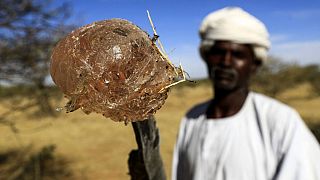
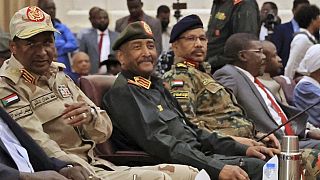
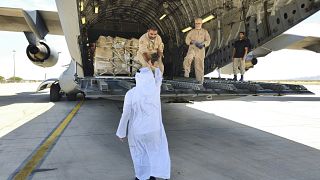
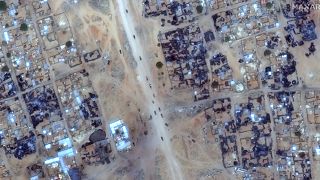
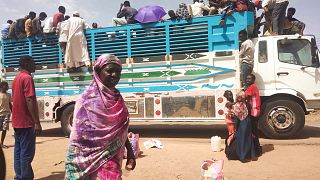
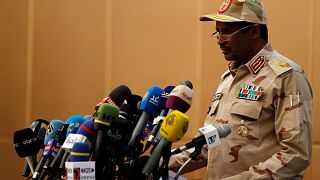



01:06
UN warns of deepening Haiti crisis
02:35
Sudanese Refugee Children Find Hope in Libyan School
Go to video
Libyan leaders call for an inclusive political process
Go to video
South Sudan: top UN official in the country warns of risk of new civil war
01:46
UN officials warn of worsening crisis in eastern DRC